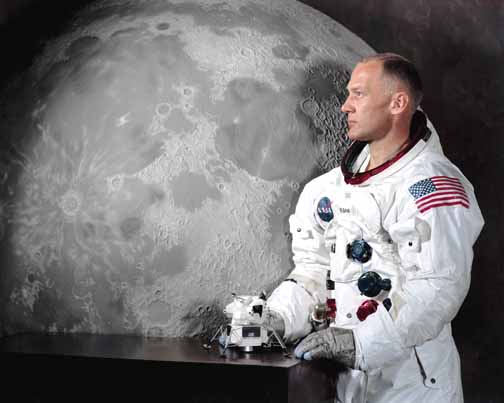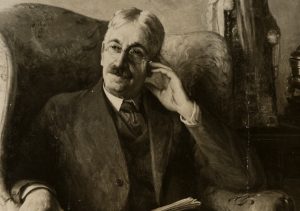July 20, 1969—a day that would go down in history, as the first humans went on to set foot on the Moon. With an estimated 530 million people worldwide watching at the time, today’s generation can recall their parents or grandparents describe the chills they felt as Neil Armstrong spoke his famous words.1 People today tend to forget that there was a second man to touch down some fifteen minutes after Armstrong: Edwin “Buzz” Aldrin, a man sometimes forgotten simply because he was not the first man on the Moon, on a mission that could have been quite capably another NASA tragedy.
The Apollo 11 Mission consisted of a crew of three men; Apollo 11 Commander Neil Armstrong, Command Module Pilot Michael Collins, and Lunar Module Pilot Edwin “Buzz” Armstrong.2 On July 16, 1969, the crew prepared to launch from Cape Kennedy in Florida. Aldrin described what he saw, as his colleagues were being strapped into the rocket. He took in the moment and the magnitude of the journey the crew was about to embark on:

“As far as I could see there were people and cars lining the beaches and highways. The surf was just beginning to rise out of an azure-blue ocean. I could see the massiveness of the Saturn V rocket below and the magnificent precision of Apollo above. I savored the wait and marked the minutes in my mind as something I would always want to remember.”3
At 9:32 a.m. on July 16, 1969, the Saturn V Rocket ignited, launching the crew of Apollo 11 towards the Moon some 238,900 miles away. Aldrin poetically describes his view of Earth from space, “The thought reoccurred that wars are generally fought for territory or are disputes over borders; from space the arbitrary borders established on Earth cannot be seen.”4
On July 20, with the ever growing Moon in sight, the Lunar Module detached from the Command Module. From here on out, Aldrin was the pilot. It was his turn to etch his name in the history of humankind.
While advancing toward the Moon’s surface, the dreaded yellow caution light came on. Being so far away from Earth, yet so close to the surface of the Moon, the astronauts’ only hope was that the malfunction wasn’t critical. “Hearts shot up into throats while we waited to learn what would happen.”5 The crew received another caution warning before being told by their flight commander back in Houston to proceed. Following the first two warnings, Aldrin and Armstrong went on to receive at least three more warnings before being reassured, once again, that the mission was still a go.
July 20, 1969 at 4:17 p.m. — Edwin “Buzz” Aldrin successfully lands Lunar Module Eagle on the surface of the Moon in Mare Tranquillitatis (The Sea of Tranquility). Command Center has been painfully waiting four long days to hear Aldrin radio the words of success: “Houston, Tranquility Base here. The Eagle has landed.”6

Edwin “Buzz” Aldrin became the second man to set a pair of footprints on the surface of the Moon some fifteen minutes after his Command Leader Neil Armstrong initially touched down. When asked about the Moon’s scenery, Aldrin described it as “Beautiful, beautiful. Magnificent Desolation.”7 The crew spent the following hours taking samples from the Moon, taking photos, and of course, planting the American Flag on the Moon’s surface.
Twenty-one hours after landing, it was time to head back to Earth. The Eagle would meet back up with the Command Module Columbia and its pilot Michael Collins in the Moon’s orbit. The crew shared a brief celebratory moment before preparing their return voyage—back towards Earth’s orbit. The crew would return to Earth eight days after launch, landing in the Pacific Ocean on July 24, 1969.8 In a stunning display of American science Buzz Armstrong, along with the rest of the Apollo 11 crew, ultimately ended the Space Race—heeding President John F Kennedy’s 1961 call to put American men on the Moon and safely return them before the decade’s end.

“And, therefore, as we set sail we ask God’s blessing on the most hazardous and dangerous and greatest adventure on which man has ever embarked.” — John F. Kennedy, September 12, 1962
- Sarah Loff, “Apollo 11 Mission Overview,” NASA, April 17, 2015. http://www.nasa.gov/mission_pages/apollo/missions/apollo11.html. ↵
- Lawrence W. Baker, Sarah Hermsen, Rob Nagel, Peggi Saari, Space Exploration Reference Library (Detriot; UXL, 2008), 178. ↵
- Edgar M. Cortright, Apollo Expeditions to the Moon: The NASA History (Courier Corporation, 2012), 204. ↵
- Edgar M. Cortright, Apollo Expeditions to the Moon: The NASA History (Courier Corporation, 2012), 206. ↵
- Edgar M. Cortright, Apollo Expeditions to the Moon: The NASA History (Courier Corporation, 2012), 212. ↵
- NASA Content Administrator, “July 20, 1969: One Giant Leap For Mankind.” NASA, February 19, 2015, http://www.nasa.gov/mission_pages/apollo/apollo11.html. ↵
- Buzz Aldrin and Wayne Warga, Return to Earth (Open Road Media, 2015), ebook. ↵
- Buzz Aldrin and Wayne Warga, Return to Earth (Open Road Media, 2015), ebook. ↵



97 comments
Iris Reyna
Good job on the article Nathan, it was informative and educational and was put together nicely. I hope to one-day study aerospace engineering so as to read about Buzz Aldrin and to read about everything he did for NASA and how he was one the few that were chosen to go to the moon first. Hopefully one day I will be able to work on something that will be sent to the moon.
Griffin Palmer
I honestly wished this article was a bit stronger. All it really talked about was the beauty of launching to the moon and some side facts here and there. I wish they went more in depth with Buzz Aldrin and why he was so crucial to the moon landing happening apart from the fact that he was the Lunar Module pilot.
Abbey Stiffler
The significance of Buzz Aldrin is frequently overlooked or obscured by Neil Armstrong’s name. Since this was such a significant period in our history, I chose to read this article. I couldn’t picture traveling into space and not enjoying it, thus I truly loved reading about it. The second man to walk on the moon, Buzz Aldrin, calls it “lovely and wonderful.”
D'vaughn Duran
I really enjoyed reading about this topic because at this time it was important and still is to this day. I can’t imagine going into outer space and not actually enjoying it. Buzz Aldrin is the second man on the moon and he describes it in saying beautiful and magnificent. I would think going into space is a very angelic feeling. Lastly, I thought this article was very interesting because it does describe his emotions and his feelings going up high.
Madison Magaro
This was a great article that talks about the efforts that Buzz Aldrin made so he could get to space. Even though he was the second man to step on the moon, he should still be talked about more because of all the contributions that he made. Overall the author did a great job at describing Buzz Aldrin as a man and made me want to look more into his story.
Andrea Tapia
Amazing article! I really loved how Buzz Aldrin was the main character here. Neil and him were brave men who did the impossible, but Aldrin should have deserved the little credit he did for being there that day. Even though he landed on the moon second, they were both great heroes and outstanding men and both deserve equal credit. I’m glad his story can be shared more and the images helped out so much. This was a beautiful mission and will always be remembered. These astronauts risked their lives for us and showed us how we can do the impossible.
Hunter Stiles
First of all congratulations on the publications of your article! The significance of Buzz Aldrin’s efforts to this mission and his role in making history are underrated. Because there is always a very skilled team behind every narrative that worked so arduously to find new things and share them with the rest of the world, I adore reading stories where you understand the background of these significant historical events and successes. The significance of perspective is shown by Aldrin’s remark about borders that are invisible from space. Individuals often see certain things as crucial or significant to their well-being, but when viewed from a different angle, it becomes clear that we ordinary people are ignorant of our surroundings. Congratulations on your article!
Dylan Miller
I really liked this article! I’ve actually met Buzz Aldrin before as a kid, so reading up on him now and learning more about him is great! As a kid, I would look up to space and wonder about how I can get up there, but as time went on I found my passion somewhere else, however, reading about it has always been fascinating to me! Aldrin did so much for NASA, and the fact that he was one of the few to make it up there to the moon first is really exciting, and interesting to read!
Leon Martinez
Such a perfect ending to a decade of uncertainty, these three men would pave a way for the upcoming generations to follow in their footsteps. Being able to see this happening in my own mind has made this article more powerful than just reading it, it has put a mental vision that enlightens me to know just a little more about the mission. For those that were not alive during this time, you were able to capture the feeling, and thoughts that went through Buzz Aldrin’s head. Your use of pictorial references has added to that feeling and I give you Kudos for this amazing article.
Ashley Martinez
Buzz Aldrin is such a significant figure that is often forgotten or hidden behind Neil Armstrong’s name. I really enjoyed reading about this article because this was such an important moment in our history, the First men on the moon. I loved the content of this article but I specifically appreciated how Buzz Aldrin was highlighted throughout this article for his importance to this historical event and his bravery. I hope that in the future when this story is brought up in our society that Buzz Aldrin receives the credit that he deserves.